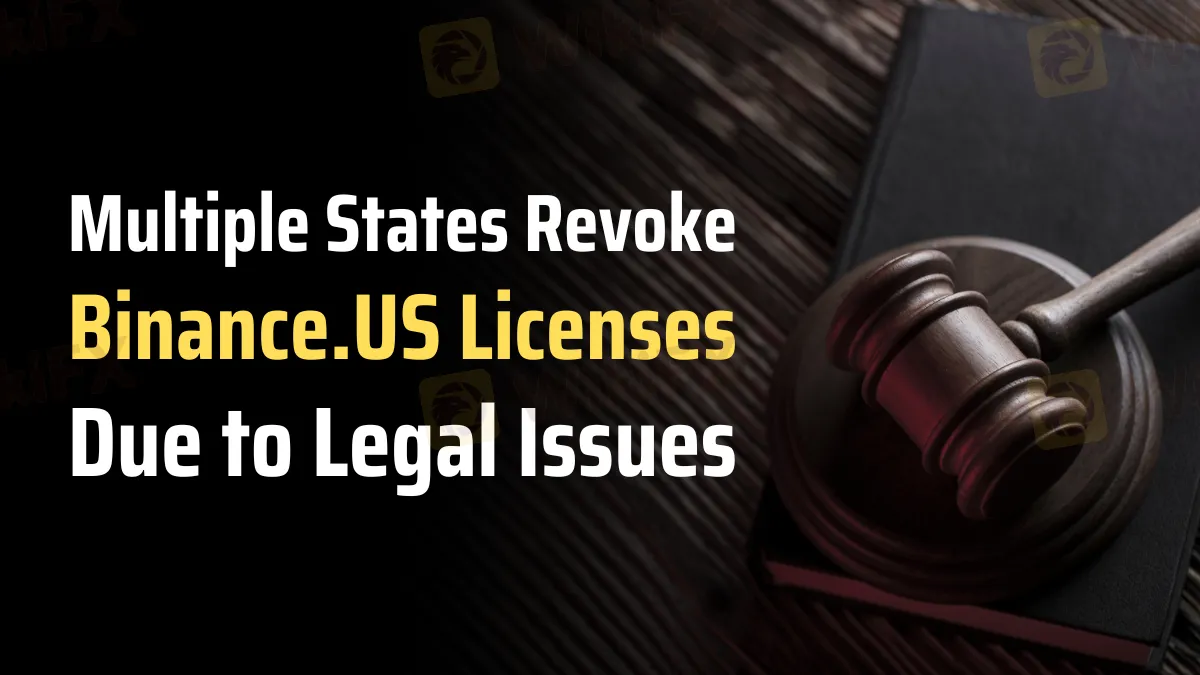简体中文
繁體中文
English
Pусский
日本語
ภาษาไทย
Tiếng Việt
Bahasa Indonesia
Español
हिन्दी
Filippiiniläinen
Français
Deutsch
Português
Türkçe
한국어
العربية
Multiple States Revoke Binance.US Licenses Due to Legal Issues
Abstract:Binance.US faces regulatory challenges as multiple states revoke money transmitter licenses due to compliance issues and legal troubles of former CEO Changpeng Zhao.

A major regulatory setback has been dealt to Binance by several US jurisdictions that have either withdrawn or denied renewing its money transmitter license. The division of the worldwide bitcoin exchange for the United States. The reason for this action is continuing legal problems and compliance concerns with Changpeng Zhao (CZ), the company's former CEO.
The Department of Financial Institutions in North Dakota is the most recent to move against Binance.US. The regulator said on Monday that Zhao's recent legal issues and non-compliance with state legislation had resulted in the termination of the exchange's money transmitter license. Zhao is now serving a four-month jail term after recently entering a guilty plea to breaking US anti-money laundering legislation. Along with the U.S. Department of Justice litigation settlement, Binance was also hit with a stiff $4.3 billion fine.
“Money transmission activity includes receiving money or cryptocurrency to send to a location within or outside of the United States on behalf of another person,” the banking regulator of North Dakota said. The legitimate operation of this company requires a license, according to North Dakota Century Code Chapter 13-09.1.

North Dakota is hardly the only state seeing the regulatory crackdown. November of last year, shortly after Zhao's guilty plea, Florida had already suspended Binance.US's license. Alaska came next, refusing to extend the exchange's license in January. Later that month, North Carolina and Maine did the same; Connecticut suspended the license on April 24 and Oregon revoked it on April 30.
Read more
North Dakota Department of Financial Institutions said, “North Dakota joins Alaska, Florida, Maine, North Carolina, and Oregon who have taken similar actions to revoke or deny the renewal of BAM Trading Services' Money Transmission License.”
To overcome these obstacles, Binance.US has changed its leadership to better negotiate the choppy regulatory environment. When creator Changpeng Zhao resigned as chair, the exchange named Martin Grant, a former top compliance and ethics officer at the Federal Reserve Bank of New York.
Additionally involved in a legal dispute with the Securities and Exchange Commission (SEC) is Binance.US. Allegations that were made by other Bitcoin services like Coinbase and Kraken sparked the dispute last year. Even with these challenges, Binance.US CEO Norman Reed-who was formerly the exchange's chief counsel-is upbeat. Reed has faulted the SEC for making compliance efforts more difficult by not offering precise guidelines on whether digital assets qualify as securities.
The continuous regulatory examination highlights the increasing suffering of the US cryptocurrency market as it struggles with changing legal requirements and intensified enforcement measures.
Also, access the daily news in the financial market here.

Disclaimer:
The views in this article only represent the author's personal views, and do not constitute investment advice on this platform. This platform does not guarantee the accuracy, completeness and timeliness of the information in the article, and will not be liable for any loss caused by the use of or reliance on the information in the article.
Read more

Why More People Are Trading Online Today?
Discover why online trading is booming with tech, AI, and a push for financial freedom. From stocks to crypto, it’s a thrilling hustle for all.

SEC Ends Crypto.com Probe, No Action Taken by Regulator
The SEC has closed its investigation into Crypto.com with no action taken. Crypto.com celebrates regulatory clarity and renewed momentum for the crypto industry.

Interactive Brokers Expands Crypto Trading with Solana, XRP, Cardano, and Dogecoin
Interactive Brokers adds Solana, XRP, Cardano, and Dogecoin to its platform, enabling U.S. and U.K. clients to trade crypto 24/7 with low fees.

Fidelity Investments Explores Stablecoin Innovation in Digital Assets Sector
Fidelity Investments tests a stablecoin, joining major financial firms in the booming crypto sector. Discover how this impacts digital payments and blockchain adoption.
WikiFX Broker
Latest News
Why Are Financial Firms Adopting Stablecoins to Enhance Services and Stability?
Experienced Forex Traders Usually Do This Before Making a Lot of Money
Octa vs XM:Face-Off: A Detailed Comparison
When High Returns Go Wrong: How a Finance Manager Lost RM364,000
Bridging Trust, Exploring Best—WikiEXPO Hong Kong 2025 Wraps Up Spectacularly
Fidelity Investments Explores Stablecoin Innovation in Digital Assets Sector
Interactive Brokers Expands Crypto Trading with Solana, XRP, Cardano, and Dogecoin
SEC Ends Crypto.com Probe, No Action Taken by Regulator
Why More People Are Trading Online Today?
Gold Surges to New Highs – Is It Time to Buy?
Currency Calculator









